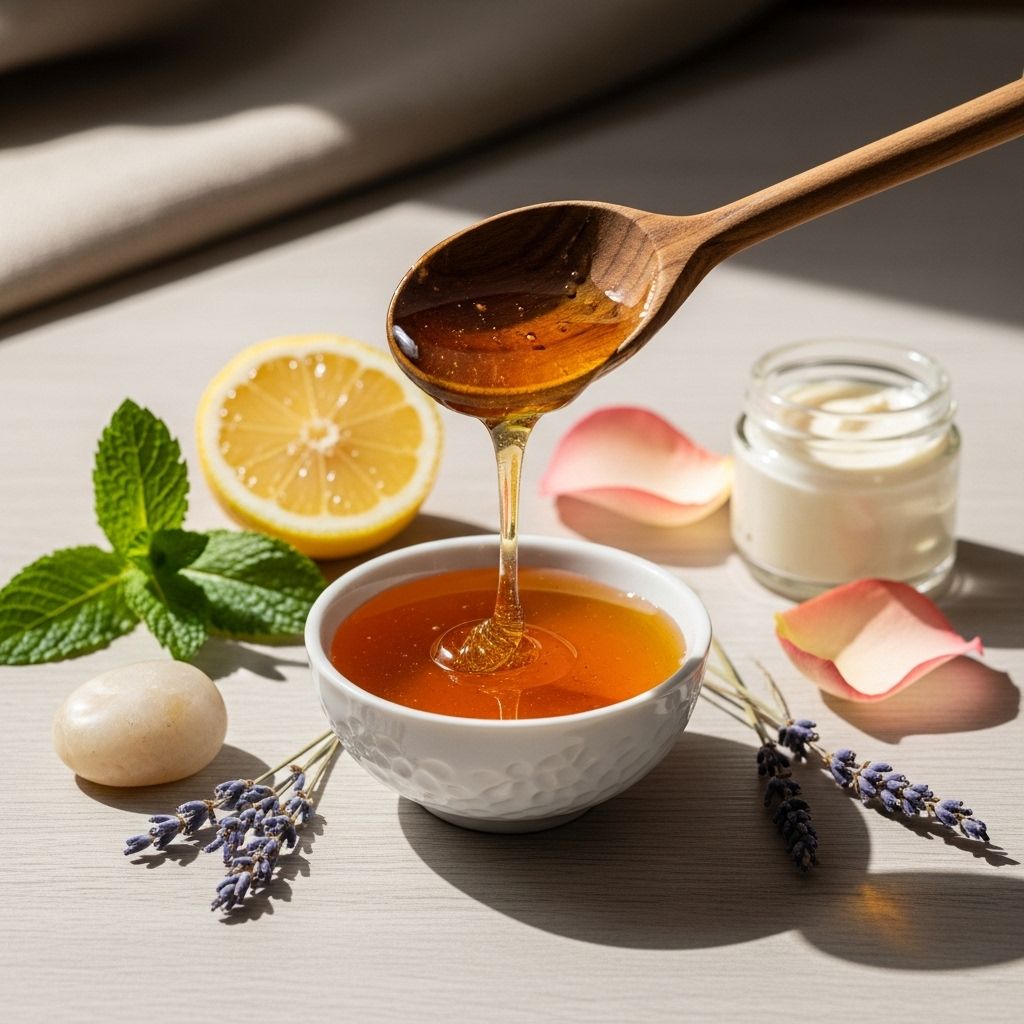7 Powerful Benefits Of Honey: Nutrition, Types, Uses & Precautions
A golden pantry staple delivering antioxidants, nutrients, and gentle soothing relief.

Honey has captivated cultures for centuries, beloved not only for its golden sweetness but also for its range of health-promoting properties. Recent research validates many of the traditional uses of honey, revealing its unique blend of nutrients, potent antioxidants, and therapeutic potential. This article explores the science-backed health benefits of honey, the different types available, its nutritional value, safety precautions, and answers to common questions, enabling you to include honey wisely in a modern wellness routine.
What Is Honey?
Honey is a natural sweetener produced by honey bees from the nectar of flowers. Its golden hue, viscous texture, and distinct aromatic profile come from its complex combination of sugars, organic acids, enzymes, vitamins, minerals, and beneficial phytochemicals. Used around the globe, honey is cherished as much for its medicinal qualities as its taste.
Nutritional Value of Honey
| Nutrient | Amount (per 1 tbsp, approx. 21g) |
|---|---|
| Calories | 64 |
| Carbohydrates | 17g |
| Sugars (fructose, glucose) | 17g |
| Protein | 0.1g |
| Vitamin C | Trace |
| B Vitamins (B2, B3, B6) | Small amounts |
| Minerals (Calcium, Iron, Magnesium, Potassium, Zinc) | Trace amounts |
Honey contains predominantly natural sugars—mainly fructose and glucose—offering a rapid energy boost. While it is not a significant source of protein or fat, its bioactive compounds (like flavonoids, phenolic acids, and enzymes) set it apart from refined sweeteners.
Top 7 Health Benefits Of Honey
1. May Help Reduce Risk Of Cardiovascular Disease
Honey is rich in antioxidant compounds such as phenols and flavonoids, which help protect heart tissues from oxidative stress and support blood vessel relaxation. This may lessen strain on the cardiovascular system, promote healthy blood flow, and potentially reduce the risk of cardiovascular diseases like heart attacks and atherosclerosis.
- Phenolic acids and flavonoids also help reduce oxidative cell damage in arteries.
- Relaxation of blood vessel walls can lower blood pressure and ease heart workload.
- Animal and small-scale human studies indicate antioxidant-rich honey may lessen heart damage, though more large human trials are needed.
2. Honey Can Help Heal Wounds and Burns
Raw honey—especially manuka honey—accelerates wound healing, including burns, ulcers, and abrasions. It contains hydrogen peroxide (a natural antibacterial agent) and has anti-inflammatory, antimicrobial properties that prevent infection while supporting tissue regeneration.
- Used in hospitals as a topical treatment for burns and pressure ulcers.
- The anti-inflammatory effect reduces redness, swelling, and pain around wounds.
- Can be applied directly or as part of medical dressings for chronic wounds.
3. Rich in Powerful Antioxidants
Honey is packed with health-promoting antioxidants, including flavonoids and phenolic acids. These compounds combat free radicals, which are unstable molecules linked to aging and chronic disease progression.
- Antioxidants are linked with reduced risk of various diseases, including heart disease and some forms of cancer.
- Dark varieties of honey tend to have higher antioxidant content than lighter types.
4. Contains a Variety of Nutrients
Although not a major dietary source of vitamins and minerals, honey provides small—but meaningful—amounts of several nutrients, including vitamin B6, niacin, riboflavin, calcium, magnesium, and potassium.
- Trace minerals and B-vitamins in honey contribute to energy metabolism, muscle function, and healthy nerves.
- Regular consumption (in moderation) provides more nutritional benefit than refined white sugar.
5. May Support Diabetes Management (With Caution)
Honey has a relatively low glycemic index (GI)—about 50, compared with 80 for refined white sugar—causing slower increases in blood sugar levels. This makes it a modestly better option than regular sugar for some people with diabetes or metabolic syndrome. However, it should still be eaten cautiously due to its sugar content.
- Some research suggests honey may lower blood sugar levels compared to equivalent carbohydrate doses from table sugar.
- For diabetes: 1–2 teaspoons per day should typically not exceed your carbohydrate goals.
- Monitor blood glucose closely after honey intake and consult a nutritionist for personalized advice.
6. May Help Reduce Cough and Congestion
Honey’s antimicrobial effects help fight common respiratory tract infections. A spoonful of honey can soothe a sore throat and suppress coughing in children and adults. In fact, both the Centers for Disease Control (CDC) and World Health Organization recommend honey for certain types of cough.
- Antioxidant and soothing effects ease throat irritation and reduce coughing, especially at night.
- Recommended (for children over 1 year old) as a safer alternative to over-the-counter cough syrups.
7. May Promote Skin Health
Honey can moisturize and protect the skin due to its antibacterial, antifungal, and anti-inflammatory effects. It’s commonly used for eczema, acne, minor wounds, and even as a hydrating facial mask.
- Topical application can speed up healing of acne, reduce inflammation, and soothe irritated skin.
- Calcium in honey aids with cell repair, and antioxidants help protect against skin aging.
- Honey is often used as a gentle cleanser or soothing ingredient in skincare routines.
Types Of Honey
Many different types of honey are available. The key categories are:
- Raw Honey: Unheated, unpasteurized, and unprocessed. Contains natural enzymes, bee pollen, antioxidants, and may offer the most pronounced health benefits.
- Regular Honey: Filtered and pasteurized for shelf stability. Has a smoother texture but may lose some enzymes and beneficial compounds in processing. Sometimes contains added syrups or sugars.
- Manuka Honey: Unique to New Zealand and Australia, produced by bees feeding on the manuka bush. Known for especially potent antibacterial and healing properties, it’s used in some medical-grade dressings and ointments.
- Other Varietals: Clover, wildflower, acacia, buckwheat, and others, each with distinctive flavor, aroma, and varying antioxidant levels. Darker honeys typically contain more antioxidants.
How To Use Honey
- Natural Sweetener: Add to teas, coffee, smoothies, oatmeal, or yogurt for natural flavor enhancement.
- Topical Remedy: Apply directly to clean wounds, minor burns, or skin irritation (use only medical-grade honey for severe wounds).
- Cough Suppressant: Swallow a spoonful for throat soothing; mix with lemon and warm water as a home remedy for colds.
- Facial Masks: Combine with ingredients like yogurt and oatmeal for a nourishing, hydrating mask.
- Baking and Cooking: Substitute for sugar in recipes (use about 3/4 the amount and decrease liquid slightly).
Precautions & Possible Side Effects
- Infants Under 1 Year: Never give honey to infants under one year due to risk of Clostridium botulinum spores causing infant botulism.
- Allergies: Those with severe pollen or bee allergies may have allergic reactions to honey.
- Blood Sugar Control: Still a form of sugar; excessive intake will raise blood glucose. Diabetics should consume only in moderation and with caution.
- Caloric Content: High in calories; can contribute to weight gain if overconsumed.
- Dental Health: Like other sugars, it can promote dental cavities if not followed by proper oral hygiene.
Honey vs. Maple Syrup: Quick Comparison
| Feature | Honey | Maple Syrup |
|---|---|---|
| Main Nutrients | Fructose & glucose, trace vitamins/minerals | Sucrose, manganese, riboflavin |
| Antioxidants | Yes (flavonoids, phenols) | Yes (polyphenols) |
| Glycemic Index | ~50 | ~54 |
| Uses | Sweetener, wound care, skincare | Sweetener, pancake topping |
| Calories (per tbsp) | ~64 | ~52 |
Frequently Asked Questions (FAQs)
Q: Is honey healthier than regular sugar?
A: Honey is considered a more nutritious alternative to refined sugar thanks to its antioxidants, enzymes, and trace nutrients. While both sweeteners are calorie-rich and raise blood sugar, honey offers some potential health benefits not found in regular sugar.
Q: Can people with diabetes consume honey?
A: Honey has a lower glycemic index than table sugar, but it still raises blood sugar. If you have diabetes, consult your health provider and limit intake—often no more than 1–2 teaspoons per day—while closely monitoring glucose levels.
Q: How can honey be used on skin?
A: Use raw or manuka honey as a natural skin treatment for minor wounds, burns, and acne. Apply a thin layer to affected skin, leave on for 10–20 minutes, then rinse.
Q: What is the difference between raw and regular honey?
A: Raw honey is unheated and unfiltered, preserving most natural enzymes, antioxidants, and pollen. Regular honey is pasteurized and filtered for smoothness and long shelf life—losing some beneficial compounds in the process.
Q: Are there any risks in consuming honey?
A: Do not give honey to babies under one year due to risk of botulism. Also, consume in moderation if diabetic or tracking calories, as honey is still a type of sugar.
Key Takeaways
- Honey is a nutrient-rich, natural sweetener with antioxidants and unique therapeutic benefits, from supporting heart and skin health to wound healing and cough relief.
- Choose raw or dark varietal honeys for the highest antioxidant and nutritional value.
- Infants and certain individuals (allergy-prone, diabetics) should practice caution or consult a doctor before use.
- Use honey as a substitute for refined sugar, in home remedies, and as part of a natural skincare or first-aid routine.
References
- https://www.stylecraze.com/articles/honey-benefits/
- https://www.bswhealth.com/blog/the-bittersweet-truth-about-honeys-health-benefits
- https://www.stylecraze.com/articles/maple-syrup-vs-honey/
- https://health.clevelandclinic.org/the-benefits-of-honey-how-to-incorporate-it-into-your-diet
- https://www.youtube.com/stylecraze
Read full bio of Sneha Tete









